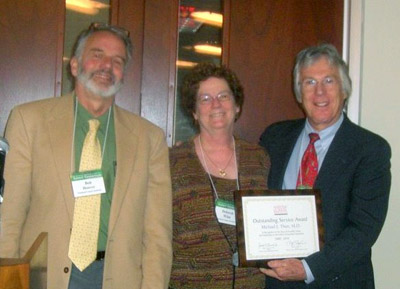Cohort Consortium's 2010 Annual Meeting
The NCI Cohort Consortium held its 11th annual meeting on November 2-5, 2010, in Atlanta, GA, at the American Cancer Society (ACS) Executive Conference Center. It was sponsored by NCI’s Division of Cancer Control and Population Sciences (DCCPS) and Division of Cancer Epidemiology and Genetics (DCEG) and the ACS.
Challenges For Next Decade
The focus was on the challenges to be faced over the next decade, which include:
- need to secure support for existing and emerging cohorts;
- need for new funding mechanisms that separate infrastructure from research support;
- development of new tools, such as for data harmonization;
- effective leveraging of the research capabilities of consortia through use of metadata;
- expansion of cohorts to more countries with different cancer rates to be able to study broader distributions of risk factors; and
- capitalizing on opportunities in metabolomics to discover biomarkers and develop new approaches to study of environmental exposures.
The consortia approach in epidemiological cohort studies has been a great scientific engine in which to exploit the explosion of discoveries in basic science, technology, and clinical science, and translate them into benefits for patients, said Robert Hoover, M.D., Sc.D., Director, Epidemiology and Biostatistics Program, DCEG. He set the stage for the futuristic discussions by reviewing the Consortium’s accomplishments over the past ten years in achieving scientific advances; establishing a collaborative network culture for interdisciplinary, team science work; and in administration and funding of consortia efforts.
Up to 41 Cohorts, 4 Million Participants
The Cohort Consortium includes investigators responsible for 41 high-quality cohorts who are studying large and diverse populations in more than 15 countries. The two latest additions, which joined in 2010, are the Millennium Cohort Study: A Prospective Study of the Health of Military Service Members, and the Carotene and Retinol Efficacy Trial (CARET). Altogether, the cohorts have more than 4 million participants, with 33 of them having biospecimens on a total of 1.5 million individuals.
 ACS’ Thun Honored
ACS’ Thun Honored
Michael Thun, M.D., M.S., ACS host of the meeting and Chair of the Secretariat for 2010, received an Outstanding Service Award in recognition of his ten years of scientific vision and leadership on the Consortium’s Secretariat. Since the Consortium’s inception, he has been a moving force in its development and is one of the Principal Investigators of the first project to be funded by NCI – the Breast and Prostate Cancer Cohort Consortium (BPC3). The BPC3 was the “proof of principle study” to demonstrate that pooling data and biospecimens across large-scale studies through consortial arrangements is an effective way to approach research on genes and the environment, and paved the way for other Consortium projects.
Dr. Thun is passionate about science, concerned about the health of people everywhere, and brings a scientific perspective to public health problems, said Deborah Winn, Ph.D., DCCPS Deputy Director.
2010 Achievements
Some of the Cohort Consortium’s scientific accomplishments in 2010 include:
- A Pancreatic Cancer Cohort Consortium study identified common susceptibility loci for pancreatic cancer on three chromosomes, 13q22.1, 1q32.1, and 5p15.33, that warrant follow-up studies. View PubMed abstract
 .
. - The BPC3, together with NCI’s Cancer Genetics Markers of Susceptibility (CGEMS) project, progressed to genome-wide association study (GWAS) discovery, replication, and identification of genetic variants associated with breast cancer risk, leading to refinement of cancer risk models. View PubMed abstract
 .
.
Additionally, BPC3 has identified at least 38 loci associated with prostate cancer, including three loci found through the BPC3 aggressive prostate cancer scan. At least one of these loci, kallikrein 3, also has been found to be associated with prostate-specific antigen levels, and several loci have been found to be in regions associated with diabetes susceptibility. - The Body Mass Index (BMI) and All Cause Mortality Pooling Project found that a body mass index between 20.0 and 24.9 is associated with the lowest risk of death in healthy non-smoking adults. The investigators also provided precise estimates of the increased risk of death among people who are overweight and obese, including precise risks for different levels of obesity. View PubMed abstract
 .
. - The Vitamin D Pooling Project of Rarer Cancers (VDPP), the results of which were published in nine papers and filled an entire issue of the American Journal of Epidemiology, rigorously investigated whether people with high levels of vitamin D were less likely to develop certain rarer cancers−non-Hodgkin lymphoma or endometrial, esophageal, gastric, kidney, ovarian, or pancreatic cancer. The investigation did not find that vitamin D conferred a protective effect against these cancers, or at the other end of the spectrum, that cancer risk was higher for participants with low levels of the vitamin. View PubMed abstract
 .
.


